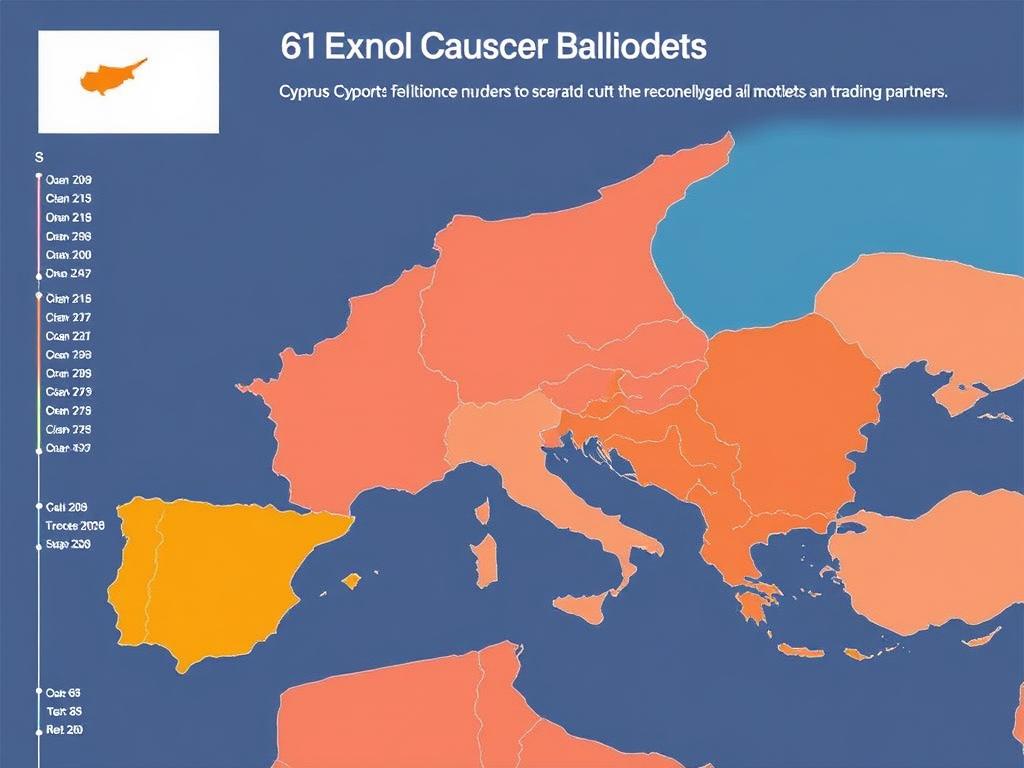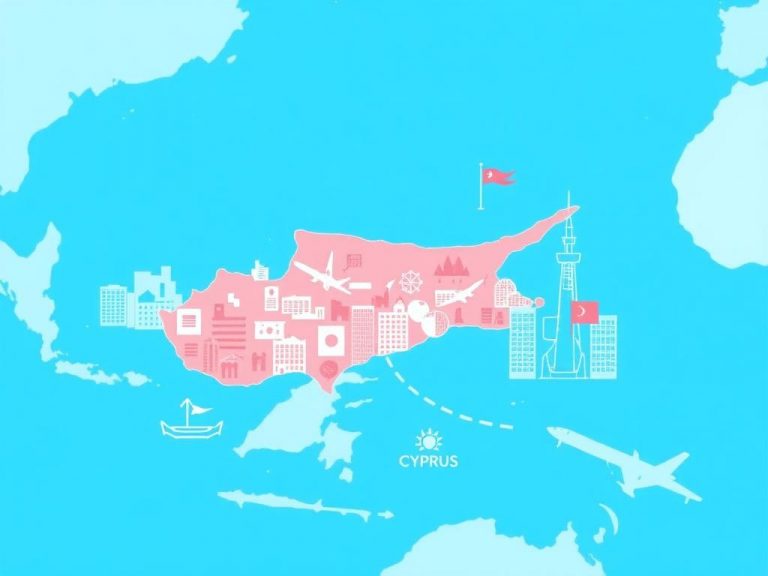Cyprus Export Economy: Key Markets and Trading Partners
Cyprus holds a strategic position in the Mediterranean, serving as a vital hub connecting Europe, the Middle East, and North Africa. This unique geographical location significantly influences its export economy and shapes its intricate web of trade partnerships. Over recent decades, Cyprus has transitioned from a relatively small, agrarian-based economy to a more diversified and open economic system, strongly oriented towards international commerce. Despite its modest size, Cyprus’s export markets have expanded considerably and have become increasingly sophisticated, reflecting both regional dynamics and global trends.
This article offers a thorough exploration of Cyprus’s export economy, focusing on its key export markets, the nature of its trade partnerships, and the broader context of its economic relations. It situates Cyprus within the global trading system, highlighting the nation’s comparative advantages and the sectors driving export growth. Additionally, the piece addresses the challenges and opportunities Cyprus faces in diversifying its international commerce while strengthening economic ties in a shifting geopolitical landscape.
Historical Evolution of Cyprus’s Export Economy
The story of Cyprus’s export economy begins with a heavy reliance on agrarian products and mineral extraction during the mid-20th century. Traditional exports such as citrus fruits, tobacco, and copper dominated the trade landscape. The export markets Cyprus engaged with were initially confined to neighboring Mediterranean countries and the United Kingdom, its former colonial power. As Cyprus gained independence in 1960 and subsequently joined the European Union in 2004, the country embarked on a process of liberalizing its trade policies, reducing tariffs, and enhancing competitiveness in international commerce.
This structural transformation involved a pivot toward service industries, notably tourism and financial services, but also included a substantial push to diversify manufactured goods and processed agricultural outputs entering global markets. The dynamic between Cyprus’s economic reforms and its external trade relations created new opportunities for export markets Cyprus to broaden their reach and complexity. Today, Cyprus export markets exhibit a blend of traditional Mediterranean ties and emerging links with global partners.
Cyprus’s accession to the EU catalyzed a pivotal shift in its export economy, opening doors to vast new export markets and commerce frameworks.
Key Export Sectors Driving the Economy
The diversification of Cyprus’s exports aligns directly with its economic modernization. Several sectors form the backbone of the country’s export economy. These include:
- Pharmaceuticals and Chemicals: Cyprus has developed a niche in pharmaceutical manufacturing, leveraging regional demand and regulatory frameworks.
- Agro-processed Products: While raw agricultural exports have declined in relative importance, processed foods such as halloumi cheese, olive oil, and confectionery remain key export items.
- Professional Services: Although not traditional “goods,” the export of financial services, shipping, and consultancy plays a crucial role in international commerce Cyprus pursues.
- Fuels and Energy Equipment: Cyprus has begun to benefit from exploration in offshore energy resources, increasing exports of related equipment and services.
- Textiles and Apparel: This sector has maintained steady export volumes due to competitive costs and skilled labor.
The emphasis on these sectors influences the structure of Cyprus’s trade partnerships, as target markets are chosen based on demand for these specialized goods and services.
Export sectors in Cyprus have expanded beyond agriculture, reflecting targeted growth in pharmaceuticals, processed foods, and service-oriented industries.
Primary Export Markets Cyprus Engages With
Understanding the geographical distribution of Cyprus’s export markets is essential for grasping the nation’s trade dynamics. European Union countries dominate as recipients of Cypriot exports, with key markets including Greece, Italy, and the United Kingdom, reflecting deep and historic economic relations Cyprus has cultivated. The proximity and EU membership offer Cyprus preferential access and reduced trade barriers, fostering robust commercial exchanges.
Beyond Europe, Cyprus has expanded its reach through strategic relations with Middle Eastern countries, leveraging cultural and historical ties, as well as growing Gulf economies’ demand for Cypriot products. Major partners in the Middle East include Israel and the United Arab Emirates, which represent vital gateways for exports related to pharmaceuticals, technology, and processed foods.
In recent years, Cyprus has also invested in developing stronger linkages with Asian markets such as China and India, driven by increasing international commerce Cyprus promotes through free trade agreements and diplomatic relations. These markets offer significant potential for growth due to their large populations and rising consumption capacities.
| Region | Key Export Markets | Dominant Export Products |
|---|---|---|
| European Union | Greece, Italy, United Kingdom, Germany | Pharmaceuticals, processed foods, textiles |
| Middle East | Israel, UAE, Lebanon | Pharmaceuticals, processed foods, shipping services |
| Asia | China, India | Manufactured goods, technology, agro-products |
European Union countries remain the cornerstone of Cyprus’s export markets, though Middle Eastern and Asian partners are rapidly gaining importance.
Trade Partnerships Cyprus Cultivates for Growth
Trade partnerships Cyprus has built over decades are critical to maintaining and expanding export volumes. These are established not just through commercial arrangements but also via bilateral and multilateral agreements that enhance market access and regulatory cooperation.
The EU framework continues to underpin Cyprus’s main trade partnerships, reinforcing adherence to common standards, dispute resolution mechanisms, and smooth customs procedures. This EU-centric approach reduces risks and transaction costs for Cypriot exporters.
Additionally, Cyprus maintains active economic agreements with non-EU countries, negotiating bilateral trade deals to diversify its dependency and enter emerging markets. For instance, Cyprus benefits from preferential trade agreements through its association with the European Free Trade Association (EFTA) and Mediterranean basin agreements facilitating commerce with North African countries.
Moreover, Cyprus’s membership in international organizations such as the World Trade Organization (WTO) and the Commonwealth also enhances trust and cooperation in trade activities. Shipping and maritime trade partnerships play an outsized role, given the dominance of Cyprus in the global ship registration market. This specialized facet of Cyprus’s international commerce strengthens its ties with global shipping economies and facilitates exports through efficient logistics services.
Cyprus leverages EU frameworks, bilateral trade agreements, and maritime partnerships to secure and expand its export footprint.
Challenges in Expanding Cyprus’s Export Economy
While Cyprus enjoys favorable geographic and economic conditions, its export economy faces several structural challenges. First, the small domestic market limits economies of scale, making international expansion necessary but increasingly competitive. Exporters must navigate complex regulatory environments abroad, currency fluctuations, and geopolitical risks, particularly in its politically sensitive neighborhood.
Another significant challenge is upgrading productive capacity to meet higher standards demanded by sophisticated markets, especially in the EU. The need for innovation and higher-value product development means that certain sectors must invest more heavily in research and development to sustain competitiveness.
The energy sector promises opportunities but also comes with uncertainties regarding exploration outcomes and fluctuating global energy prices. Additionally, Cyprus’s reliance on service exports, which are more susceptible to external shocks (such as pandemics affecting tourism), underscores the need for greater export diversification.
The scale and complexity of international markets compel Cyprus to continuously innovate and diversify amidst challenging external and internal pressures.
Future Directions: Strengthening Economic Relations Cyprus Pursues
Looking ahead, Cyprus is actively reinforcing its economic relations Cyprus as a strategy to secure long-term export growth and stability. This includes fostering deeper ties with emerging economies, promoting Cyprus as a logistics and financial gateway, and enhancing partnerships within the Eastern Mediterranean Energy Corridor.
Investment in digital infrastructure and green technologies is also expected to broaden Cyprus’s export base, particularly in knowledge-intensive industries. Government initiatives aim to improve export finance mechanisms, support small and medium enterprises (SMEs) in internationalizing, and capitalize on regional cooperation frameworks that mitigate trade risks.
Key strategic objectives revolve around integrating Cyprus further into global value chains, increasing the sophistication of export products, and ensuring strong institutional support for international commerce Cyprus engages in. This focus aligns with broader EU priorities and global market trends favoring sustainability, digital transformation, and regional trade integration.
Cyprus is positioning itself as a modern export hub through innovation, regional alliances, and expanded economic relations.
Unlocking Cyprus’s Export Potential: Navigating Complex Markets with Strategic Partnerships
The export economy of Cyprus encapsulates a compelling narrative of transformation, resilience, and strategic outreach. Small in size but ambitious in scope, Cyprus’s blend of traditional industries and modern sectors reveals a nuanced economic landscape that adeptly balances historical ties with progressive global commerce demands. Through well-structured trade partnerships and a broadening portfolio of export markets Cyprus has cultivated, the country continuously adapts to shifting economic dynamics while confronting inherent vulnerabilities.
Ultimately, the strength of Cyprus’s export economy lies in its ability to leverage geographic advantages, foster innovation, and maintain robust international relations. The future trajectory of Cyprus’s export markets will depend heavily on sustained efforts to integrate fully with global trade systems, diversify export offerings, and deepen economic relations Cyprus champions with both established and emerging partners. Success in this endeavor will solidify Cyprus’s position as a resilient and influential player within the Mediterranean and global export economy.
The future of Cyprus’s export economy hinges on strategic diversification and strengthened economic relations that adapt to global shifts and regional opportunities.
Frequently Asked Questions
- What are the main products that Cyprus exports?
Cyprus primarily exports pharmaceuticals, processed agricultural products like halloumi cheese and olive oil, textiles, fuels and energy equipment, and services such as shipping and financial consultancy. - Which countries are Cyprus’s largest export markets?
The largest export markets for Cyprus are European Union countries, particularly Greece, Italy, the United Kingdom, and Germany. The Middle East and Asia are also growing markets. - How does Cyprus benefit from its EU membership in trade?
EU membership provides Cyprus with access to a large single market, reduced tariffs, harmonized regulations, and trade facilitation, which strengthen its export capacities and reduce trade barriers. - What role do trade partnerships play in Cyprus’s export economy?
Trade partnerships enable Cyprus to expand market access, navigate regulatory requirements, enhance logistics, and diversify export destinations, thereby boosting export volumes and stability. - What challenges does Cyprus face in expanding its exports?
Key challenges include the small domestic market, competition in global markets, the need to upgrade product quality, geopolitical risks, and vulnerabilities related to service-sector dependency. - Is Cyprus focusing on specific regions for future export growth?
Yes, Cyprus is targeting Middle Eastern and Asian markets, especially countries like Israel, UAE, China, and India, while continuing to strengthen ties within Europe and the Mediterranean. - How is Cyprus adapting its export economy to global trends?
Cyprus is investing in digital infrastructure, green technologies, innovation, and regional cooperation to diversify and sophisticate its exports in line with evolving global market demands.







